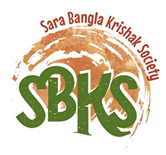Objectives of SBKS:
Sara Bangla Krishak Society, a promising alliance of landless, marginal and small farmers organizations, was formed in 2013.
The major objective of the alliance is to empower farmers’ organizations (FOs) of small, marginal and landless farmers from the economically fragile areas of Bangladesh, in such way that they can become equal, active and supportive partners in the decision making processes of agricultural development and investment programs of the government.
It aims to do this in the following ways:
- Organizing and mobilizing interested farmers into viable socio-economic groups in order to improve their livelihoods;
- Sensitizing small farmers groups about the importance of building strong bonds among members through providing need-based services and community businesses;
- Facilitating bridging among strong farmers’ organizations with the objective to become a united voice and helpful partner in the agricultural development of Bangladesh, bringing the experience and perspective of the farming community to the table.
Sara Bangla Krishak Society believes that through these bonding and bridging processes, the network will be able to speak for the marginalized and act as conscious and assertive members of their communities and groups, also providing skill training to undertake gainful economic activities, including advocacy and social businesses.
With this in mind, Sara Bangla Krishak Society will:
- identify registered farmers’ organizations of small, marginal, landless farmers who are actively working locally, and invite them to join the network;
- identify and prioritize local agricultural challenges which are badly affecting most of the farming community, and facilitate the farmers’ organizations to overcome these challenges;
- introduce bulk purchase of inputs and marketing of produce. This will help members own their organization and result in a strong bond among members;
- facilitate experience sharing meetings, solidarity visits to the FOs who have a strong membership base and good governance, and mentoring of weak FOs by experienced FO leaders with the aim to build strong bridges among FOs;
- communicate with different government extension agencies to ensure better services for members of FOs;
- educate FO leaders on analyzing agriculture friendly policies and citizen charters of extension agencies so that FO leaders can benefit from the services offered and participate in the government’s decision making process for agricultural development and investment programmes;
- facilitate dialogue with government extension agencies and government policy planners on identified local, regional and national level issues which affect the farming community;
- support FO leaders’ representation in the different local, regional and national level agricultural committees;
- collaborate with Government and international agencies in efforts to facilitate self-sufficiency by the neglected and distressed people of the society.
To do all such other lawful things as are conducive or incidental to the attainment of objective and furthering the growth of the network.
